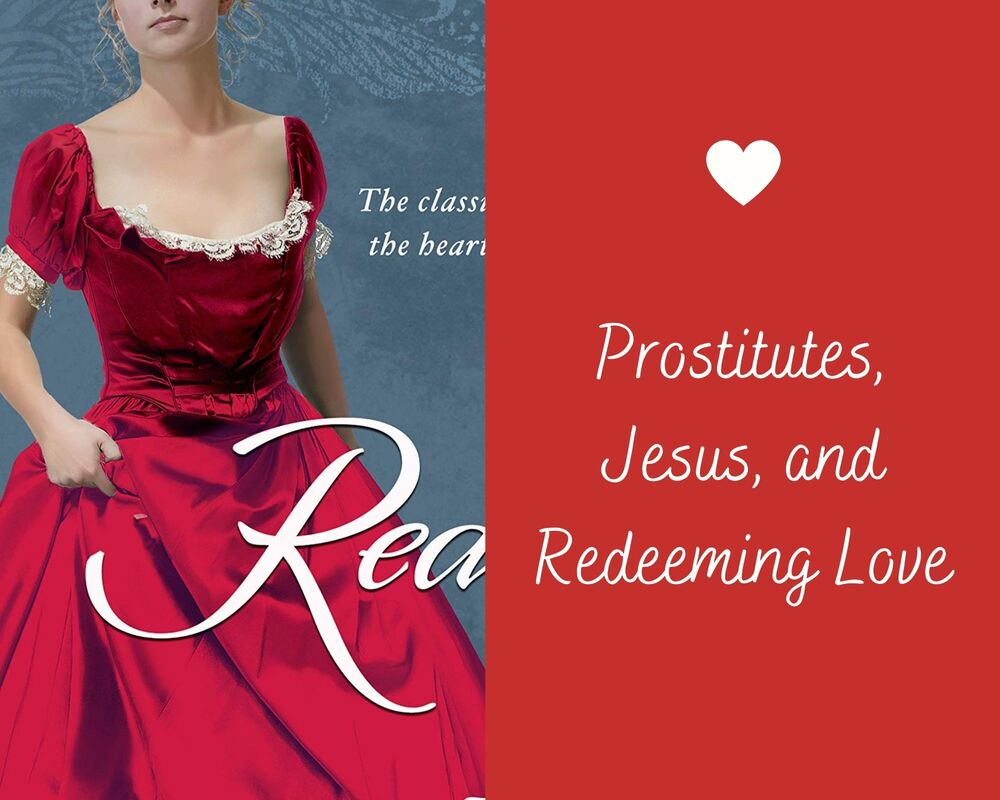|
*This is about the NOVEL Redeeming Love . The movie version is a different medium, and thus would require a different discussion. *
The book Redeeming Love is getting renewed attention because of the movie recently coming out, and going to see the movie myself prompted me to read it for the third time. So much has already been said about this amazing book, I wondered what more I could possibly say. Yet, as I re-read it, I found I actually had a lot to say. With renewed controversy about this book, I almost have too much to say. So many have been vehement and even angry over this book, I was honestly hesitant to share my own opinion at all. After more wrestling and prayer than should be necessary for a book review, I’ve decided to write a rather lengthy review of Redeeming Love. Actually, it’s not really a review. I feel like the Lord has taken me on a spiritual journey upon this third re-read, and I want to share it with you. It’s a little bit of a Bible study, too, so I hope you’ll bear with me! The first question I’m sure most of you want me to address is this: is this book too sexually explicit? The first two times I read Redeeming Love, I was nineteen and twenty-two, respectively. I was unmarried and fairly naive. So reading it now, as a married forty-four year old, my perspective has changed greatly. Publishing two romance novels and being in that romance writing "world" has also changed it. I remember as a younger woman being so scandalized by the sex scenes in this book, but now? Um, ya'll, they're not that risque. Though this book is about a prostitute, all "business" is done behind closed doors. The only sex actually described is done so in a very tasteful way and in the context of marriage. I'll be blunt - I have read smut (usually by accident, but yes, I confess I have read some), and this ain't it. I realized that my own books are more explicit, which came as quite a shock to me! (And yes, I realize there have been two versions of this book - one secular and one Christian. All three times I read the Christian version.) One particularly scathing negative review I read held particular scorn for Angel being a prostitute at all. The fact that the book is supposed to be a retelling of the book of Hosea, in which God instructs Hosea the prophet to marry Gomer, a prostitute, didn’t make a difference to this reviewer. She said her pastor taught that Gomer wasn’t a prostitute when Hosea married her, but a Godly woman. She only turned to prostitution later. This didn’t sound right to me, but I looked it up just to be sure. Well, right out of the gate, in Hosea chapter one, verse two, God says to Hosea: “Go and marry a prostitute.” My Bible is the New Living Translation, so to be thorough I looked it up in other translations too:
She was a prostitute, everyone. Gomer was a prostitute. But, you know what? That bad review reminded me of my freshman year of college when my Old Testament professor dropped this bomb: “How many of you have been taught that Rahab wasn’t a prostitute but just an inn-keeper?” I was among those who raised their hands. My professor proceeded to obliterate this reading of the text. There’s just no way to sugar-coat it, folks. Rahab was a prostitute. She is also listed in the lineage of Jesus and in the “hall of faith” in Hebrews. Know who else is listed in the genealogy of Jesus? Bathsheeba, who committed adultery, and Tamar, who prostituted herself to her own father-in-law. Judah, after discovering that Tamar is pregnant with his child, calls her “more righteous than he.” (The story of Tamar is a wild one that I don’t have time to fully go into, but I encourage you to read it for yourself). The point is, God doesn’t shy away from addressing this issue, so why do we? When I searched the word “prostitute” in Bible Gateway, I got 79 results. Twelve of them are in the New Testament, and in three of those instances they are about Jesus dining with them, prostitutes believing in him, and in one instance Jesus even says prostitutes will come to the kingdom of God before the pharisees! Now, Jesus also spoke against prostitution as a sin, and so do other verses in the New Testament. However, the point is, we see Jesus acting with compassion to these women and redeeming them the same way Rahab’s faith redeemed her. All of this Bible study caused me to examine a startling question: why do we treat the past sins of women in scripture differently than that of men? The scripture doesn’t do this, mind you, we do. We have no trouble, for example, admitting that Moses was a murderer. We don’t see it as troublesome that David was both an adulterer and a man after God’s own heart. Yet, Rahab? She couldn’t possibly have really been a prostitute. We either see certain sins as irredeemable, or the church has held women to a different standard. Redeeming Love addresses this. Angel isn’t impressed that Michael is a man of God - plenty of “religious” men have paid for her services. There are very few trustworthy men in the book, and two of them (the shopkeeper Joseph and the cafe owner Virgil, both of whom give Angel a job so she won’t have to prostitute herself), state that they would partake of the brothel’s offerings if they had enough money to do so. Only three men in the book are faithful to their wives and morally clean of prostitituion: Michael Hosea, John Altman, and Jonathan Axle. Paul, although portrayed by the author as having many moral failings, is seen by those around him as a “good man” even though it is no secret he has visited the brothels. I don’t think any of this was an accident on Francine Rivers' part. Even today, men are much more readily excused for their sexual misbehaviors than women are. We may not have brothels now like in the wild west, but we do have a thriving sex industry that is largely consumed online. In all the discussions about the church’s pornography problem, rarely do I see Christian men challenged to see the way they are contributing to rape, pedophelia, or human trafficking by their actions. If Christian men could fully grasp this, what kind of change might we see in the world? In one startling scene at the end of Redeeming Love, Jonathan Axle offers to take Angel out of the brothel where she is being forcibly held by her former child abuser, Duke. Angel refuses to leave without the two girls Duke is also holding captive: one around eight and the other only fifteen. As Angel bravely walks through the crowded saloon, carrying tiny little Faith in her arms, one man asks, “Why does he have a child here?” Angel boldly looks him in the eyes and asks, “Why do you think?” Yet the same men disgusted by a child prostitute never questioned whether Angel wanted to sell her body or not. Those realities of the sex industry are something the book refuses to shy away from. We learn all the horrific things done to Angel. Yes, done TO her. While the book also bluntly describes sinful choices Angel herself made along the way, it makes it abundantly clear that Angel is trapped. It makes it obvious how she was groomed for a life she can not escape. This makes some people offended too, I think. On the one hand, self-righteous people like to believe that a harlot is a harlot with no right to any compassion. On the other, liberated feminists don't want to admit that sometimes we need to be rescued. Male, female, it doesn't matter. People trapped in abuse often can not save themselves. It doesn't make us patriarchal or anti-feminist to admit that. It makes us compassionate. I think this book is more timely than ever because it captures so well the psyche of those trapped in the sex industry. We like to think that's cut and dried, too. We imagine human trafficking entails the type of slavery that requires kidnapping and locks and keys, but that isn't always the case. The poor, the orphaned, and the cast aside were at risk for exploitation during the gold rush, and they still are today. Just like Angel, these broken people sometimes return to the hands of their captors after gaining their freedom. It doesn't mean they are choosing that life. It means, like Angel, they were groomed and abused for so long and so deeply that they think they can have no other life. Or they think their bondage is actually freedom. Again, they deserve our compassion. It’s clear to me from scripture that it’s what Jesus would have done. It’s what God’s been doing all along. Redeeming Love is not your typical sanitized Christian fiction, that’s true. Neither is it for everyone, and that’s okay. However, I think it can give many of us a lot to think about and can point us to the greatest truth of all: that the redemptive power of Christ has no limits.
2 Comments
|
Melanie TillmanI am a former English teacher turned homeschool mom of three who writes Christian romance novels on the side. You know, in my huge amount of spare time. Archives
August 2022
Categories
|



 RSS Feed
RSS Feed
